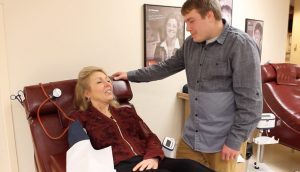Quintin Knutzen shares his story
By Scott Bellile
A 25-year-old man who has undergone three heart surgeries is on a mission to inspire people to give blood and save others’ lives.
Quintin Knutzen of the town of Liberty has been collaborating with The Community Blood Center to share his story of how blood donations saved his life.
He and his mother, Beth, organize donation events throughout northeast Wisconsin to build up the blood supply and help people out there who may find themselves in a hospital fighting for their lives.
The Knutzens were invited to tell their story before approximately 400 people at The Community Blood Center’s donor recognition event held in Appleton Tuesday, Feb. 26.
Quintin recently shared his survival story with the Press Star.
Quintin was born with a rare congenital heart defect known as transposition of the great arteries. This condition causes improper blood circulation in the body.
When the fetus’s heart forms abnormally, the large vessels that carry blood from the heart to the lungs – the aorta and pulmonary artery – develop inverted. Specifically, the aorta connects to the right ventricle and the pulmonary artery links to the left ventricle, opposite of a normal heart.
In addition to transposition of the great arteries, Quintin was also born with a hole in his heart.
Quintin had his first operation at age 2 where surgeons inserted an artificial conduit and fixed the hole.
When Quintin was 7, he had his second surgery to replace a heart valve with an artificial one.
After that, Quintin went 17 healthy years before needing another surgery.
Despite his health issues, Quintin said his childhood was normal as a student attending Emanuel Lutheran School in New London and later Fox Valley Lutheran High School in Appleton. The only ways he differed from his friends were he had to avoid contact sports and he went in for checkups every six months.
Quintin understood as a child he would eventually need a third heart surgery because he would outgrow the artificial tubing in his heart.
However, that third surgery crept up on him with little warning last summer when he was 24.
Quintin was in Denver, Colorado, for work when he got sick with what he suspected was the flu. As the illness worsened, he thought it could be strep throat instead.
He visited an urgent care clinic and tried taking amoxicillin for a few days. Nothing improved. Quintin was also too dehydrated to try IV therapy.
Quintin returned to Wisconsin and his family took him to the emergency room.
He was admitted to a local hospital for a few days. After spiking fevers and failing to respond to antibiotics, he transferred to the Children’s Hospital of Wisconsin in Milwaukee. (The children’s hospital treats people of all ages for congenital heart issues.)
Quintin learned a bacterial blood infection was attacking the weak and foreign parts of his body, including his artificial heart valve.
With 17 years having passed since Quintin’s last surgery, he needed to have replaced the artificial conduit in his heart that he had outgrown before doctors could treat the blood infection. His family decided to proceed with the open-heart surgery.
Despite the urgency of the situation, Quintin said undergoing his third heart surgery with little warning was a relief. The months of anticipation before a surgery can be stressful, he said.
“Looking back, I was kind of thankful for that,” Quintin said of the abruptness.
Toward the end of Quintin’s 12-hour surgical procedure, he began bleeding profusely.

Photo courtesy of The Community Blood Center
It was the hospital’s supply of donated blood that kept him alive during surgery.
Beth is unsure how much blood he went through because she is still working to obtain Quintin’s surgical records.
“It was just a lot,” Beth said.
“Without it, he would not be here.”
People incorrectly assume blood centers have an abundance of blood on hand, Quintin said.
Having an O-negative blood type, Quintin said on average 10 Americans would need to donate blood before one provides his type.
“I don’t even want to think about what it would be like if [the surgeon told me], ‘Oh, yeah, we know what to do, but we can’t because there’s no blood. We have no way of doing it,’” Quintin said.
The brutal winter weather has dampened donor enthusiasm, according to Kristine Belanger, vice president of donor services for The Community Blood Center. On some days, the center only reaches half its goal.
“It’s no secret how bad the winter has been, and you imagine every time a school cancels or workers are encouraged to stay home or work from home, that really impacts blood donation,” Belanger said.
Non-donors often cite inconvenience as their reason, Belanger said. She disagrees with that excuse because local communities frequently hold blood drives, and The Community Blood Center takes people by appointment at donor centers in Little Chute, Appleton and Oshkosh.
To add extra encouragement, Belanger said, “It’s a pretty rare situation where all you have to do is give an hour and you know you’ve saved somebody’s life.”
Beth invites New London area residents to participate in a blood drive on Tuesday, March 5, from 12:30 to 6 p.m. at Emanuel Lutheran Church, 200 E. Quincy St. To register, visit the church or The Community Blood Center website, or call 800-280-4102.
Beth, who unlike her son has never received blood, said she has never had a bad experience donating it.
“The feeling you get from doing it, there’s no way of describing it,” she said.
Speaking as a past recipient, Quintin found a way to describe the feeling.
“It means everything to me, really, especially because you don’t get anything [tangible] for it,” he said. “You really lose time. So it’s even more magnified that way, that you’re not doing it because you’re getting 50 bucks every time you’re doing it. … It’s about the most selfless thing you can do.”
